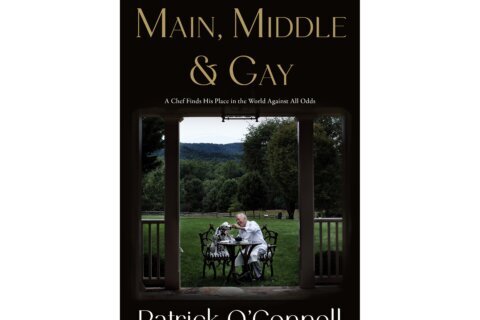Hear our full conversation on my podcast “Beyond the Fame.”
For over 30 years, they’ve delivered one of music’s most unique sounds.
On Tuesday, Crash Test Dummies perform live at City Winery in D.C.
“I still pinch myself,” Co-vocalist Ellen Reid told WTOP. “I kind of thought it was just going to be a way to help pay my hydro bill as I was going through university.”
Born in Manitoba, Canada in 1966, Reid loved all kinds of music growing up.
“When you’re little, you generally listen to the music your parents listen to, so I listened to a lot of folk music and classical music,” Reid said. “As I got older, I don’t think I was particularly unique, I liked the bands that people were into, rock bands, I was a big Aerosmith fan for a long time, but as I got older I got back to folk music and roots music.”
In 1986, she met Brad Roberts to join Bad Brad Roberts and the St. James Rhythm Pigs.
“I met Brad at the University of Winnipeg,” Reid said. “He had this little group playing at an after-hours club called The Blue Note. He was looking for a keyboard player to play on a few songs and a mutual friend introduced us. I just got up and played a few songs with him and it just went from there. I didn’t even sing for the first full year playing with that band.”
How did the band name evolve into the now-famous Crash Test Dummies?
“It actually came from a medical student friend of Brad’s,” Reid said. “He had been watching crash-test simulations all day long, so he suggested that one. He had also suggested The Oxymorons, which is one that I kind of wanted. I had been leaning toward The Oxymorons, but Crash Test Dummies won out — and I guess we’re stuck with it.”
Roberts took listeners’ ears by storm with his unmistakably deep voice.
“He’s always been a bass baritone,” Reid said. “When we were first starting out, he kind of struggled with that because all of his musical idols had higher voices and could do those heavy-metal high screams. … He like Alice Cooper and Kiss. … Male vocalists at the time had a higher range … but eventually, he just started writing material for his range.”
The band’s debut album “The Ghosts That Haunt Me” (1991) had a powerful title track.
“Everyone has a different interpretation,” Reid said. “For me, it’s more like when you meet someone and they accept you for who you are, you can let go of all these things that have been haunting you. ‘You’re so kind, I know you would not mind, to send away the ghosts that haunt me now.’ I think it’s about being accepted for who you are, warts and all.”
It also featured “Superman’s Song,” which was a huge hit in Canada, creating a political allegory where Superman is a liberal activist and Tarzan is a laissez-faire capitalist.
“It’s a song about the underdog and the behind-the-scenes people that make things happen,” Reid said. “Superman didn’t make money for what he was doing; he did it because he cared about his community … whereas Tarzan was just pounding his chest.”
The band won Group of the Year at the Juno Awards (i.e. the Canadian Grammys). Their second album, “God Shuffled His Feet” (1993), was their biggest, including a title track of biblical proportions about mankind asking God questions on the seventh day of creation.
“Brad was very much hands-on in the recording of this record,” Reid said. “He spent hours and days searching for sounds that he wanted to create. … He really did a huge amount of the production on that record. He worked very hard. There is nothing by accident on that record. That recording of that song, there are 20 tracks of me, background vocals alone.”
The album’s biggest hit was “Mmm Mmm Mmm Mmm,” describing a boy’s hair changing pigment after an accident, then describing a girl ashamed of her birthmarks, and saying a third child has it even worse watching his parents convulse at church speaking in tongues.
“Ultimately, it works because it’s just a good song,” Reid said. “Melodically, I think it’s beautiful. Lyrically, it’s easy to go ‘Mmm Mmm Mmm’ in English as in German as in French. Everyone can hum along to that song. It wasn’t like anything else you were hearing on the radio at the time. … A couple of radio stations liked it and just played the crap out of it.”
The album also featured deep existential exposes, from a fear of getting old (“Afternoons & Coffeespoons”) to predicting one’s death (“The Psychic”) and even a warning against hedonism as frolicking medieval men get eaten by tigers (“Two Knights and Maidens”).
“Brad has a very specific viewpoint on life, he has a very particular way of looking at the world and that comes through in all of his lyrics,” Reid said. “He has a lot of questions. He is an English philosophy student in his whole life, so he always asks the big questions.”
Soon, Reid began singing lead on songs like “The Ballad of Peter Pumpkinhead” (1994).
“Brad’s always been very conscious of not wanting to present the same record twice,” Reid said. “Bringing my voice more into the fore was just a way of breaking up the bass-baritone thing and showing that we had more stylistic range, not wanting to do the same thing.”
Both “Pumpkinhead” and “Mmm Mmm Mmm Mmm” made their way onto the soundtrack of “Dumb and Dumber” (1994). Just when you thought Crash Test Dummies couldn’t get any “dumber,” they did something like that…AND TOTALLY REDEEMED THEMSELVES.
“I had been singing the song ‘Peter Pumpkinhead’ in our live shows for a while, really just a live-show thing, an opportunity for me to get out front and center,” Reid said. “The people who were putting ‘Dumb and Dumber’ together approached us and asked if we would record it for their movie. We didn’t know anything about it … but we said, ‘Sure. Why not?'”
Their sound continued to evolve across “A Worm’s Life” (1994), “Give Yourself a Hand” (1999), “I Don’t Care That You Don’t Mind” (2001), “Jingle All the Way” (2002), “Puss ‘n’ Boots” (2003), “Song of the Unforgiven” (2004) and Reid’s favorite “Oooh La La!” (2010).
“I can tell you without even hesitating to get ‘Oooh La La,'” Reid said. “That’s the last recording that we did 12 years ago and it’s a beautiful record. I can just say that without hesitation. It’s a beautiful record. We do one or two songs from that, and one of them, last night … we had four people in the front row crying, so we’re going to make you cry.”
Hear our full conversation on my podcast “Beyond the Fame.”








